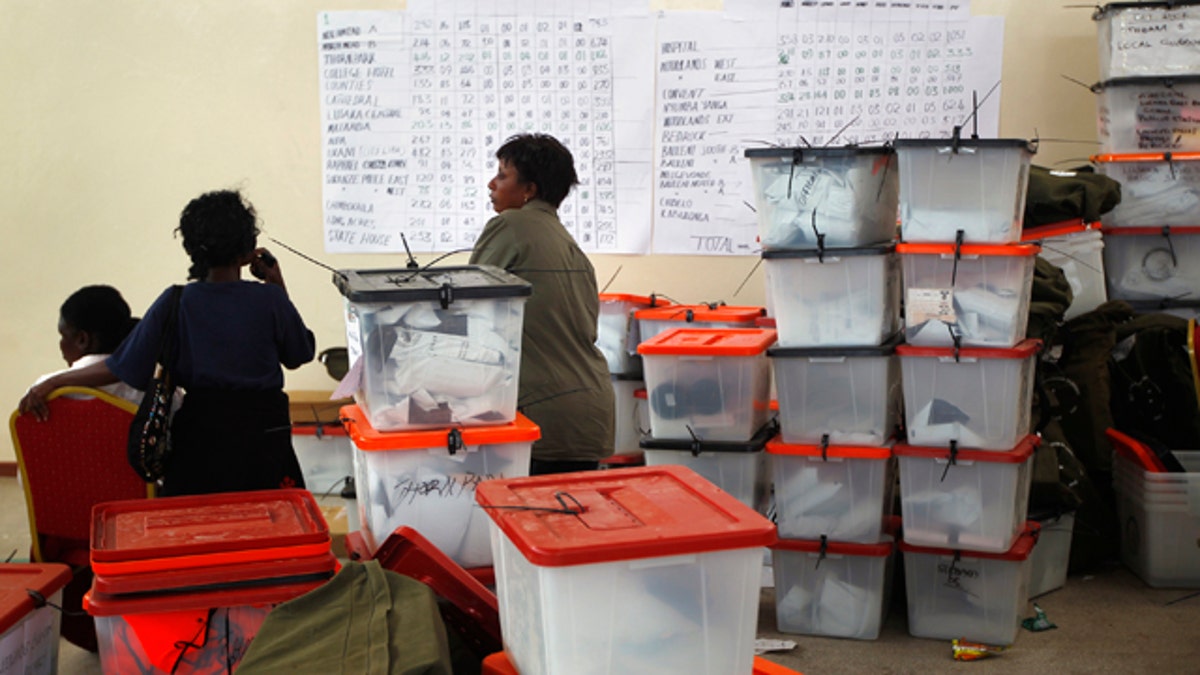
Sept. 22: Election volunteers stand by ballot boxes stored at the Civic Center in Lusaka, Zambia. (AP)
LUSAKA, Zambia – Zambia's incumbent President Rupiah Banda is conceding defeat at the hands of veteran opposition leader Michael Sata.
Banda said in an address Friday on national television and radio that all Zambians must unite following this week's presidential election.
He said: "Zambia must not go backward. We must all face the future and go forward as one nation."
Sata's victory in Zambia ends 20 years in power by Banda's Movement for Multiparty Democracy.
With tallies completed from nearly all the country's 150 constituencies, Sata won with 1,150,045 votes, or 43 percent of the total. President Rupiah Banda had 961,796 votes, or 36.1 percent. Eight other candidates shared the remainder, Irene Mambilima, the Electoral Commission's chairwoman, announced early Friday.
Banda's party -- of which Sata had been a member until a 2001 leadership dispute -- had been in power for two decades. But this is not the first hand-over of power from one party to another in this southern African country.
Thousands of Sata supporters celebrated the news, setting off fireworks and dancing in the streets of the capital. Sata's supporters have rioted after previous losses, and violence has followed recent elections elsewhere in Africa.
Sata, a former provincial governor and Cabinet minister known for his populist, anti-China rhetoric, left Banda's Movement for Multi-Party Democracy to form his own Patriotic Front party in 2001.
Sata lost elections that year and in 2006 to the MMD's Levy Mwanawasa. In 2008, after Mwanawasa died of a stroke, Sata narrowly lost a special election to Banda, who had been Mwanawasa's vice president.
Friends and foes call Sata, born in 1936, "ba mudala ba Sata," which means "Old man Mr. Sata." He's also known as "ba King Cobra" -- Mr. King Cobra, for his famously sharp tongue.
Some analysts said Banda benefited from voter sympathy when he won by just 35,000 votes in 2008. Then, Zambia's economy was in trouble. Now, the country is benefiting from rising world copper prices. The boom has helped create 100,000 jobs in Zambia and the government has built bridges, airports and hospitals with revenue from copper.
While Banda took credit for the strong economy, the race had been expected to be close, in part because the ballot was crowded. The two differed little on the issues, with Sata even toning down his usual criticism of China's massive investment in Zambia's economy. Local issues ate away support for Banda in some areas.
Sata was a policeman under colonial rule, rising to become the most senior black officer. He also trained as a pilot in Russia.
He later went into business, as a consultant on property and other deals. He started in politics as a municipal councilor and later was appointed governor of Lusaka, a city as well as a province, by Kenneth Kaunda, Zambia's first president after independence in 1964. Sata also served as Kaunda's junior minister for local government.
In 1991, Sata resigned from Kaunda's United National Independence Party and joined Frederick Chiluba's newly formed MMD. Chiluba defeated Kaunda in Zambia's first multiparty elections in 1991, and Sata served as an MMD lawmaker for 20 years and as minister for local government, labor and social security, and health.
